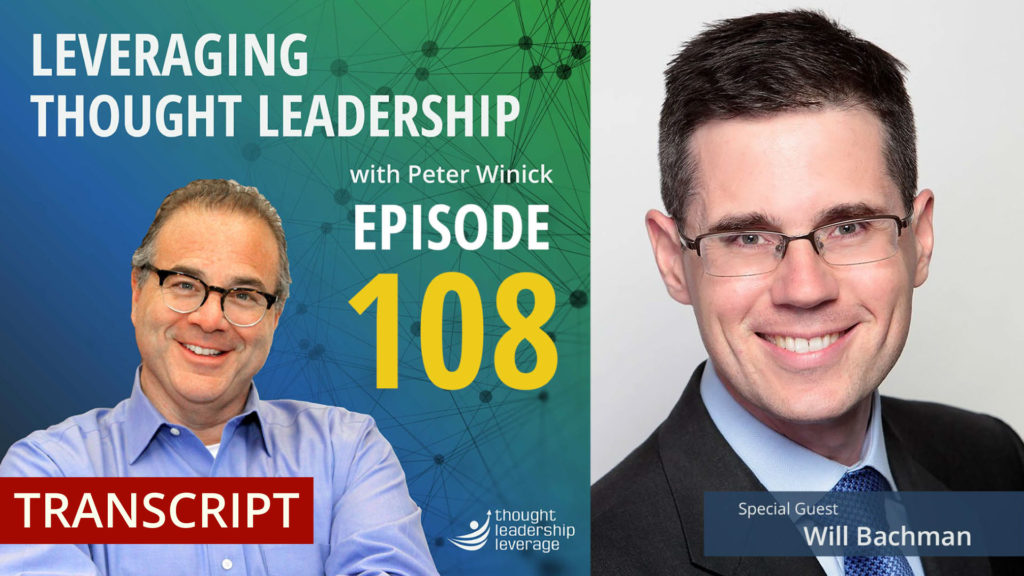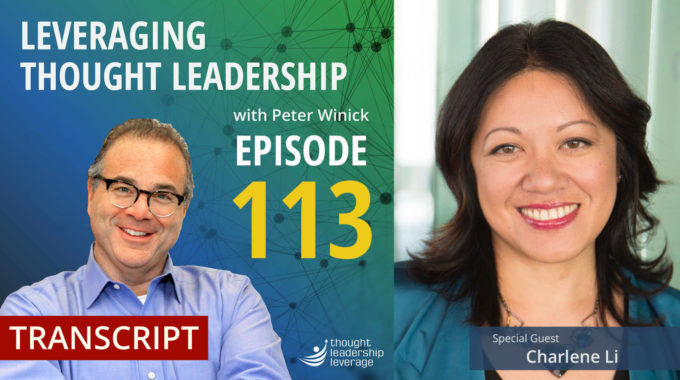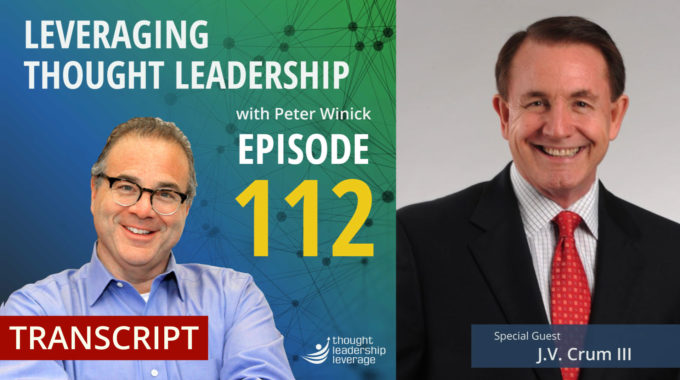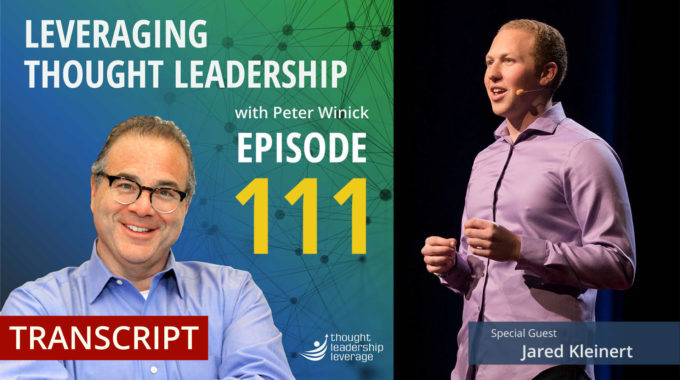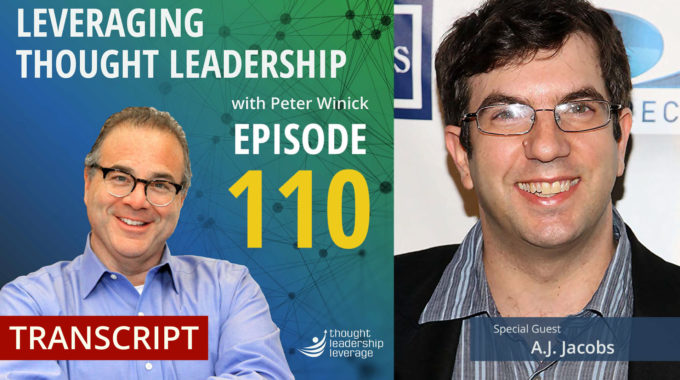Helping Your Thought Leadership Marketing Find Range, Reach, and Results. An interview with Charlene…
Building Relationships to Support Your Thought Leadership Marketing | Will Bachman
Thought Leadership Marketing and Building Relationships
An interview with Will Bachman about thought leadership marketing, networking, and building relationships to foster and grow your content business.
Summary: We interviewed Will Bachman, a McKinsey trained independent management consultant. He’s also the Founder of Umbrex, a global community of independent, top-tier management consultants. Today, he talks to us about building relationships to support your thought leadership marketing.
Three Key Takeaways from the Interview:
- Thinking of your thought leadership content through many different modalities.
- Raising awareness through content, social media, and building relationships for your thought leadership marketing.
- Why building relationships to support your thought leadership marketing can be the key to success.
Transcript:
Peter And welcome, welcome, welcome. This is Peter Winick, the founder and CEO of Thought Leadership Leverage, and you’re joining us on the podcast today, which is Leveraging Thought Leadership. Today, my guest is Will Bachman. He is the founder and CEO of Ulbricht’s. He’s a former McKinsey trained management consultant, been running his own practice since 2008. He’s got a weekly podcast, which is really good called Unleash How to Thrive as an Independent Professional. His core work, which is which is an interesting niche, is working with independent consultants and professionals. And he has an umbrella organization to help them drive business. But he uses a lot of content and fall leadership to get the message out there and attract the right folks into the tribe. And I’m glad to have him on board today. So, thanks for coming on board.
Will Bachman Well, it is great to be here. Thanks for having me.
Peter Oh, my pleasure. So, tell us a little bit about your core business and then we’ll get into sort of your use of content involved leadership as a way to help that business grow and thrive. Sure.
Will Bachman So I left McKinsey and Company revenues go now in two thousand eight to start my own independent consulting practice. And soon thereafter I was reading Tribes by Seth Godin and I felt the need to myself have a tribe and connect with other independent consultants because really, while I knew how to do some consulting, I didn’t know how to run a consulting practice. How you work, what should I charge, how to find an accountant? Insurance. So, I’ve started connecting with other independent professionals and that grew over time. It was helpful to me and other people seem to find it helpful. And that eventually evolved to Umbrex, where we the first global community, connected top to independent professionals with one another. And the business model is we help clients find the right independent consultant for their project needs.
Peter So this is sort of a network model, right? So, you’ve got the consultants on one end and then folks that need consulting services on the other. Tell me a little bit around. What folks tend to struggle with I have some hypotheses here. When they leave a world-renowned firm like McKinsey, where they’re awesome at what they do, they’re super smart. They know how to solve the problems in order of the client, etc. But there’s this whole other world of stuff that they don’t need to touch that is critical when you go out on your own in terms of finding clients, building, scoping, coming. But that sort of transition for the folks in your network.
Will Bachman Sure. So far there’s three categories of what a consultant does and the people that I work with, with a struggle with two of those. So, three categories are actually delivering the work. Finding the work and then the infrastructure to support it. So, most people in Umbrex, they were at a top tier consulting firm. They’re fantastic at delivering projects. But when they leave the kind of branding and the support of a big chart, people struggle with how to generate moves. Now, as an independent, how do I find opportunities? So, and then the other pieces, just the firm infrastructure, you know, how to do accounting, and PowerPoint, and research, and an insurance broker and just all that.
Peter Right. Technology, travel and insurance, all that, all the fun stuff that we all need to do.
Will Bachman Which is essential, you can spend 20, 25 percent your time on just kind of the infrastructure of running a practice session. We help people with that as well.
Peter Got it. So now tell me about you have an interesting business model. So, I’m one and you get to connect the supply and demand. It’s a marketplace. You got to find the right folks, have the right criteria to be service providers under the Umbrex umbrella and then you’ve got to find the clients. Now, let’s dove into because this is an interesting piece for me, and I think for a lot of our listeners. How does one use or how do you use content and thought leadership and all those things to attract either of those constituents that are critical to your business?
Will Bachman Well, I often talk to members about this. I think it’s important if you want to separate yourself from being a commodity project manager. So, you know, to really where someone’s calling and asking for you in particular, you want to establish thought leadership platform and where you’re recruiting content. For one, it’s just a reminder advertising. If you’re creating some content on a regular basis already, just remind people that you exist because often there was probably a client out. I would love to hire you, but there’s just frankly forgotten about you forgot your name. I want to remind people and also tell people in the community was that’s a great role, for example, to build relationships with people. If you’re creating content by interviewing someone either for a blog or a podcast or how to create relationships with that person, as well as learn about your industry and stay current. So, I recommend people that are kind of what their focus is to think about creating some kind of thought leadership platform.
Peter So specifically, how have you gone about doing that? Because you’ve done a nice job in it. What does that look like?
Will Bachman Well, and for me, it’s you know, if you think about kind of return on investment to move the podcast that I do, Unleashed is really I don’t think about it in terms of a short term return on investment. I think through that piece is really about building relationships with independent consultants and learning myself. It’s so, you know, I’ve learned a tremendous amount by having a chance to interview over a hundred people. And I think doing that gives you kind of right to have a conversation with someone that, if you just say, has to spend an hour on the phone with me. Most people would say No. Right now on the phone with me and we’ll make a podcast and it’s a chance to promote doing a bit more mental health.
Peter I said, basically, let’s not have that same conversation. But here’s the other benefits, right? We can create some content. I get about her platform. So it really serves both purposes. But there’s more value to the guest because it’s a podcast, not just two folks chatting away and eat up an hour of my time. Right.
Will Bachman I mean, to answer your question, it’s given me the chance to build relationships with independent consultants who then I’ve collaborated with on actual project opportunities and beyond the benefits through. Some people have told me that podcasts that we go over more, that it’s now kind of one of the top results on Twitter for my name. Let’s hear it. They’ve reached out to me and said, Hey, I heard you on that show. So even though it’s not a benefit to me for some benefit to Bess’s as where those in their profile.
Peter Interesting. Interesting. So, you’ve done 100 episodes. What are the sort of best practices? I hate to ask a consultant for most practices because I be here all day. What is the condensed version of the best practices of running a podcast for you for the purpose of increasing awareness for your business? Let’s keep that specific question.
Will Bachman For purposes of increasing awareness, let’s say number one, start. So that’s maybe one. But does. If you’re not doing it well, then no credit. So, start now. And number two would be do it on some regular basis. So, if you can only handle the monthly. OK, so probably a good one to shoot for the benefit of doing it on some regular basis. Is that it’s always the easiest thing to not do? Right. So, if you have some video thing, I will shoot. No, I gotta carve out some time this week and then it becomes a habit and then it becomes something you don’t even notice that you’re doing. So, start making a regular habit. And then when I recently learned from Mark Metry, who has Humans 2.0, Top 100 podcast. Create some micro content. So, take that. One minute snippet. Make a short at Instagram kind of them and put that out there to help raise awareness. Every podcast posted on LinkedIn and so forth that you posted, don’t just say, here’s my latest podcast episode, how to make a conversation when you post on social media. I so invite a question like, hey, here’s something that we’ve talked about on this past. What do you think?
Peter So a little teaser snippet. Cool. So, can you give us what you’ve been doing it for a while. And I love what you said earlier. This is not something that you can measure on. OK, so I just did that podcast. I created X dollars for that value for that. Forty-eight minutes of my time. Doesn’t work like that. But could you give specific examples of value that has been created for you and your organization and the consultants in your network as a result that you can attribute to the podcast?
Will Bachman Sure. So, I’m sort of doing something a little nontraditional in that I’m really focused with on Umbrex on building or community. So, I’m not interviewing potential clients typically. So, it’s not direct benefit, but there’s been half a dozen situations where a client called me and I was able to stop someone on a project with them, someone who I had interviewed. And I was able to say, look, I know this person and here’s an episode. You can listen to them talking with me before you reach out to them and interview them. So, it’s kind of gave me a lot of credibility in that person that I’m not just introducing some random person, I don’t know.
Peter So that’s interesting. So, let me ask on that. So normally the process might be a client comes to you. I need a consultant that, you know, has done this, that the other thing, whatever supply chain in Asia, whatever. And you say, oh, great, I’ve got this guy, Charlie over here and you send him their CV or whatever. And on paper, it all looks good. But I think I think there’s something really, really interesting to say. Well, here’s their CV and all that. But by the way, listen to this hour of them talk because it really shows how someone thinks what their perspectives are. It’s a nice sort of little way to sort of eavesdrop on who they are, what they’re about or where that land.
Will Bachman Yeah, I think that’s right. It gives it gives some credibility to that introduction that we’re doing. And, you know, I think beyond just those red we’re working with Umbrex is really trying to create a community. So, it’s even if we create value for members that we don’t capture. That’s a win for us. So, it also helps introduce members to the other members of our community and interest. That’s a win. Know, even if I’m not getting like a financial benefit from it, I get personal satisfaction out of it.
Peter Got it. Well, and it’s creating, like you said, sort of another touch point for the community. Another reason, because I’m assuming you’ve got top quality consultants in your network that could find gigs elsewhere. Right, there’s competition on both sides that you need to make sure that you’ve got a nice pipeline of talented consultants to do the fulfillment side of the house.
Will Bachman That’s right.
Peter Good. So, what are the other ways that you have, have or are considering using content and thought leadership to increase awareness to the brand to drive the business? Because we’ve a lot of clients that we work with that are consultants and such that are experimenting or have experiment that we’re thinking of experimenting with thought leadership and content as a way to differentiate, drive the business. What are other things that you’ve dabbling with?
Will Bachman Well, other things that I’ve done is for Umbrex members who run professional development events three times a year. Couple in the U.S. and one in Europe. So often content that that we use in those in those events kind of emerges from the podcasts, from discussions I have with people. I’m also developing a course for people on how to thrive as independent, professional and out of the Raj, the drawing from a lot of material from all these podcasts.
Peter So the court I’m assuming is distant. So, you have physical events in different geographies where you have a concentration of folks.
Will Bachman That’s right.
Peter And you’re bringing them in and it’s sort of a gift to the community, some sort of a development day for consultants, right. So, they’re going to learn or be exposed to something that’s of interest to them.
Will Bachman That’s exactly right. We do those. We kind of charge to cover the costs. We start say as it that. Yes, that’s right. And then I’d say I’ve actually myself had a few projects with clients where they called me and just to my own working out, not staffing someone based on my knowledge of this space as well as some things that I’ve done. I got a session on how to. Expert interviews and I did another session on how to, you know, how to use resources online to be more efficient at work, so forth. I’ve done some running for clients based on it. And you know, what I’ve heard from other folks as well is just that it’s a corpus of work that you can show people, but just birds’ your credibility, you know, doing some kind of thought leadership. So, what you’re doing, I think, is fantastic of helping enable that with your clients.
Peter Got it. So how do you decide then doing an in-person day in different cities? That’s pretty intense to do. It gets expensive and there’s a lot of work that goes into that, etc. How did you decide what sort of buckets of content would work? Well, digitally, so that you can get it out there to more people more often and all that sort of stuff. What was the decision making process underneath that to say this module here in this segment would work and conversely, these would.
Will Bachman Yes. So, the online course that I’m developing is on how to set up your firm, OK? A does be firm as an independent professional. So that’s based on conversations with, you know, a thousand people over the past several years.
Peter And that’s obviously focused on the consultants that are just in that transition state, exploratory state, etc. Obviously sort of the one to one for them would be, geez, how do I set up my firm? Right. So it’s a nice problem that you’re answering for them early on.
Will Bachman Yeah, that’s exactly right. So, part of the essay with the podcast was originally that I was going to write a book based on my own experience. And I sat down and I cranked out a couple chapters, the book that was written. Right. You know, another way to think about a podcast is to write a book in public over a period of time, a page at a time, kind of haven’t done now 150 episodes. It’s really a way to gather information and, you know, over time. And that’s, you know, that eventually might make its way into a brick. But I’m planning at first to put it into a course. And now that I’ve done enough, I’ve had enough conversations to understand where people’s pain points are. And I’ll be able to structure the structure that was kind of drawing from a lot of these interviews that I’ve done.
Peter Got it. So, you’re basically sort of forensically writing a book or doing it. You know, the byproduct of each of the podcasts is also, you know, whatever, ten pages in a book or whatever the math turns out to be. Yeah. So, from an efficiency standpoint, that’s pretty good, particularly if you don’t really love writing. I mean, a lot of people don’t realize that the process of writing a book. Some people love it. Most don’t. Most find out you’re talking to somebody earlier today and she was talking about sort of before by the time she got the 14th revision on the manuscript, she hated her own book, you know, which is not fun.
Will Bachman And even if you do enjoy writing, it’s often hard as a professional to actually carve out the time. And by the way, one tip occurred to me that I should have mentioned earlier. You asked about, you know, tips would be create some kind of subscription list to your podcasts so people may be subscribing on Stitcher or ITunes or Evercast, whether they get their podcast. It’s nice to have some kind of email list where you could send out maybe some bonus content or just to remind people what episodes were that week. So, I think that you have something like that. Yeah. I have one on the page for my site so that people really can remind people that they don’t listen. Every episode kind of reminds them about what’s going on. So, if they do see an episode that they’re interested in and then if you’re creating some content in the future, you have to be kind of opt in permission marketing that third term. You have to opt it in and want to hear from you.
Peter Got it. When you have to, you have to meet them where they are. Right. In terms of where are the folks that you’re trying to reach? Looking for information. So the more modalities you have that line up to the way they consume content, the higher the probability they can find you.
Will Bachman Yeah. And you know, there was I don’t expect someone to listen to every episode of my show that there might be occasionally some episode that really is particularly relevant to them. So, having an interest, they can just see gears of this episode. I really want to make sure I download. So, I would recommend that to everyone to have somebody. People can do a quick signup on your website.
Peter Got it. And you know, you mentioned that again, you get to a point. We’ve got a hundred podcasts. It becomes an information management issue. Right. So, you’re not going to know when you do your first five or 10, you’re gonna. Oh, yeah. When I spoke to so-and-so two weeks ago. Blah, blah, blah. But ultimately, you don’t. So, what are you doing from a curation, tagging, whatever. So that, you know, when you’re in a real-life client situation or working with one of your consultants? Wait, you know, I know I talk about that with somebody. Let me go find that, retrieve it and send it to you. What’s the process you use to managing information?
Will Bachman So often getting a transcript made of every episode. And that’s all set for download on the Web site, which. So then. So, I have a full text corpus of all the interviews that that’s searchable. OK. So, from that I’ve been I hired someone to edit those down into a more readable seven hundred word. Version of the. So, I publish those as well on LinkedIn and Medium, so that’s probably not a great answer. I think people who will have more time at work could hire someone to go through each episode and think about what categories or tags or something. So, there’s certainly more to be done. I wouldn’t claim to do best practice there, but those are the steps that I have taken.
Peter Well. But if you transcribe them and at least at a minimum, if you have an inkling that there was an issue that you talked about, you can only search it or find it. I mean, it sounds like that’ll probably mature and evolve over time.
Will Bachman Mean, the way Tim first wrote one of his books was basically took the Tim Fair share and sat down with the transcripts. And that was it read inspired me, which was to get transcripts of at least someday I can sit down with a couple of thousand pages of transcripts and see if you know what the gems are in there. Yep. And I mean, the other thing that’s seems kind of simple and straightforward, but I recommend just having some kind of tracking sheet like I use a Google sheet that I share with my audio engineer to just list the episode and keep track of them because pretty quickly we have a queue of episodes and it’s not clear what those are. In your right transcript, have you published what the number is? So, we have five. It’s not a big deal, but let’s start that early. I just am kind of tracking system.
Peter Yeah, no, I agree because there’s more to it than hit record in terms of the behind the scenes stuff and the scheduling and the engineering and getting out of all the different platforms and all that stuff. But you’re got to have a good team to help you there. So, it’s just been great. Well, as we start to land the plane here, give us so let’s say there’s somebody else out there and they might be in a similar space or not to you, but something in the professional services space. And they’re thinking maybe I should do this, maybe I should in terms of blogging podcasts, go get him good content out in order to differentiate, build the brand. What would you what would the advice be that you gave to that person or maybe that person is you 10 years ago? Actually, yeah.
Will Bachman So I would treat this as not as business development, although it’s an outcome if it happens. But I would treat this as relationship building and getting smart yourself. So almost every independent professional I think has something where they could be doing a podcast or blog. Let’s say that you are interested in connected cars. Well, start with the CEOs of startups of different connected car companies. If you’re interested in retail, well, get an interview with CEOs. Marketing rumors that a bunch of setup retail or luxury brands. So almost anyone could do that. And if you’re not going into business development, I think that’ll come across that you’re truly interested in what they’re doing and helping other visibility. Strewth, this is sort of a 10 year on a lie and not a one. One quarter are a lie and find them and just start like John Paul Miller recently did a did a short article about how we sometimes have a podcast from start to online and one hour. So it doesn’t need to be a big, long project. Just start recording, but online doesn’t have it perfect. But the only way to get good is to do a few hundred bad episodes. And that’s kind of those are the ones that I’m working through, right? So just start starting.
Peter And be consistent and that’s great advice. I appreciate your time and I appreciate you sharing because you’ve actually been using content and thought leadership in a really unique way to drive business sense. That’s quite different. So, I appreciate your coming on and sharing that with us with us today. Thank you so much.
Will Bachman Thank you so much for having me. My pleasure.
Hosting a podcast is a great way to come up with new ideas. Our COO Bill Sherman has some other ways to start your Idea Factory.
